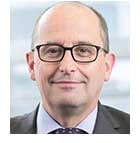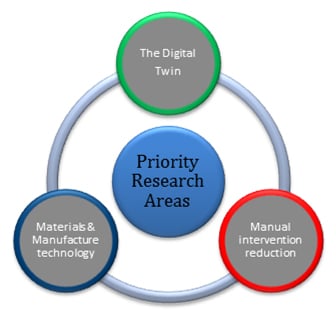
I wish all of our grants community, colleagues, and stakeholders a happy and safe 2015. Looking ahead, the Foundation has got exciting plans for the New Year. Last year we laid some good foundations, turning our strategy into action, with the publication of some important technical reviews and initiation of major grant giving. We can be proud of the progress made in essentially our first full year of operation. Communication remains a strong priority so that everybody understands and can contribute to the direction the Foundation is heading, and we can maximise the impact and benefit of our activities in line with our charitable aims. Hence the importance of this newsletter. In this edition are some important items to share, including, amongst other things, the launch of our new fund for faster research impact, and publication of the first research plan for our £15m grant to the National Structural Integrity Research Centre. Although not in this newsletter, education and training is a strong element of the Foundation’s strategy alongside scientific research. We’re consulting widely and making steady progress in mapping out our longer term plans in this area, and look forward to reporting something in later newsletters.
New fund for faster research impact
The Foundation has a new programme to help deliver our strategic them, accelerating the application of research. A new call for proposals invites current and past grant holders to apply for funds to maximise the uptake and application of the fundamental research we are engaged in, delivering clear benefits to society and achieving our charitable objectives. We expect the programme will help accelerate technology uptake, informing codes, standards and policy, and facilitate the mobility of researchers. The call has open deadlines allowing the Foundation to make timely funding decisions where there are near-term opportunities to accelerate research application. Whilst in the first instance the call is only open to those who have previously received research funding from the Foundation, we recognise that research funded by other funders might be usefully accelerated towards meeting our charitable aim, to enhance the safety of life and property. When we review the uptake of this programme later this year, we will consider whether to widen our eligibility criteria.
Promoting safety and public understanding of risk
We will be enhancing young people’s understanding of risk and safety related to engineering assets at the Big Bang, the UK’s largest celebration of science, technology, engineering and maths, 11-14 March 2015. Organisers, Tomorrow’s Engineers, will be working with the Safety and Reliability Society, major industry providers, LR Group’s Safety and Business Assurance Team and several of our funded research centres to develop, an interactive stage show at this four-day event which attracts over 75,000 school students, teachers and parents.
Young researchers come together to address global challenges
Three young researchers from our funded centres in Singapore, South Korea and Australia have been selected to take part in the third Global Young Scientists Summit in Singapore, 18-23 January 2015. Dr Harrif Santo (National University of Singapore), Mr Sang Eui Lee (Pusan National University) and Mr Xiaojun Li (University of Western Australia) will be joining around 300 of their peers together with international leaders in science and engineering, to address the challenge of Ageing in Place. www.nrf.gov.sg/gyss@one-north-2015/gyss@one-north/about-gyss@one-north
Setting our direction at NSIRC
As Founder Sponsors of the Structural Integrity Research Foundation (SIRF) based in Cambridgeshire, UK, the Foundation will move its strategy into actions by sponsoring 83 PhD studentships over the next 10 years where at least 60% of the student’s time will be based at the National Structural Integrity Research Centre (NSIRC) that is facilitated by TWI Ltd. Although centred in the UK, NSIRC studentships will be open to university partners worldwide.
The Foundation and NSIRC have now agreed the first annual plan which defines what we will achieve through NSIRC. The plan is available on the Foundation website. Within the plan we have defined the areas in which we will focus our research funding.
The projects that we select will demonstrate excellence is scientific research in the priority areas of:
Materials and manufacturing technology
New materials and manufacturing technologies have the potential to revolutionise engineering.
The digital twin
The digital twin, as the name suggests, is a digital representation that can predict the status or future status of a component, system or asset based upon measured or anticipated operating conditions.
Manual intervention reduction
 Manual inspection and regular maintenance are common during construction and throughout operation but are associated with risks to the individual, the system or the asset. How can these risks be reduced?
Manual inspection and regular maintenance are common during construction and throughout operation but are associated with risks to the individual, the system or the asset. How can these risks be reduced?
In early 2015 we will be issuing the first research calls to our grant holders and to NSIRC Academic Partners that will be focused of defined aspects of the priority areas. Links to future research calls and other ways to participate in NSIRC will be added to the Foundation website as they arise.